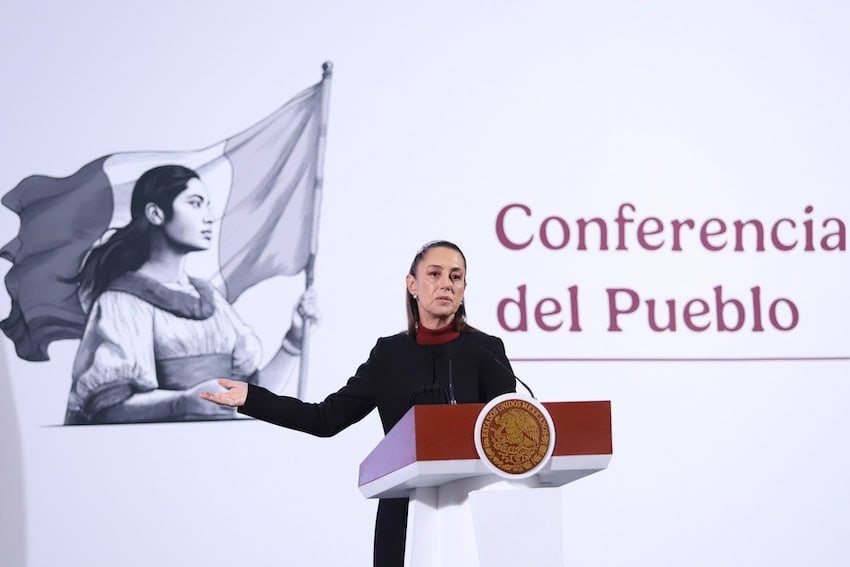My very first article at Mexico News Daily was about then-President López Obrador’s request that Spain officially apologize for the conquest. My thesis was, basically, why not apologize?
The powers that be in Spain scoffed, saying that historical events shouldn’t be judged through a modern lens. A few op-ed pieces were written about it in the Mexican papers, and people fought about it on Facebook for a bit. Upper-class Mexicans especially rolled their eyes.

“The Spaniards of today are not the same people, and neither are we, duh.“
The idea seemed to die down as more pressing matters inevitably took its place. But it apparently had not been put to bed once and for all. With the inauguration of President Claudia Sheinbaum, and later in a morning press conference, it was revived.
First, there was her inauguration. The same king of Spain who rejected an apology the first time around, King Felipe VI, was not invited. As a result, Spain sent no guests at all. Yikes!
I know it’s diplomacy, and maybe it’s because I’m currently binge-watching “Downton Abbey,” but these kinds of tiffs strike me as kind of adorable. Royalty: they’re just like us! Not invited to the big party? Everyone’s going to hear about it, now!

One of the reasons given by Sheinbaum for not extending the invitation was that King Felipe had not responded to López Obrador’s letter requesting the apology. Spain’s Prime Minister, though, was not convinced. He called it “unacceptable and inexplicable, given the level of relations between Spain and Mexico, two ‘brother’ countries.” Spain did not send a delegation to the inauguration.
“Brothers,” hmm. Well, Mexico and Spain have always had a rather tough relationship. Is it any wonder they’d occasionally participate in a tit-for-tat?
I’m sorry is all that you can’t say…
Perhaps they’ll take a page from Tracy Chapman’s “Baby Can I Hold You” and love each other despite the lack of apology? Or cooperate, at least, which is what they seem to be doing. So what about the apology?
I don’t know a whole lot about diplomatic relations, but I do know about pride and stubbornness. And one thing I know for sure is that apologizing can be hard, especially if you don’t think you should have to.

I also know that culturally, saying “I was wrong, I’m sorry,” is not easy, especially here. I can’t count how many people I know whose only version of the phrase is, “I’m sorry, but…” They then launch into all the reasons that they are right, and so of course don’t need to apologize. There are even some people who I’ve never heard apologize a single time. Say why they shouldn’t, sure, but accept responsibility?
So I’m not saying that Spain should apologize because it’s currently responsible for the atrocities committed during the Conquest. I’m saying Spain should apologize because it would be symbolically important to a lot of people.
Because while the number isn’t quite as high, in addition to the “I’m sorry, but…” people, I know quite a lot who simply hate Spain and Spaniards. Why? “Because of what they did to us.” Sigh.

To me, this has typically been just virtue-signaling. I don’t see anyone, for example, refusing to speak their language or worship their gods. “I’m discerning and angry because I have a sense of history.” Cool, cool. Is there anything you’re doing to help indigenous people today, then?
In the case of Morena, the answer is actually “kind of,” which is more than past administrations can say. Not only have they been included symbolically in high-level government ceremonies. Many of the current government programs aimed at helping those in poverty go to them, and justice plans for Indigenous people are being created and carried out under Morena’s government.
So come on, Your Majesty. Surely an important symbolic leader could give an important symbolic apology, right? It’s certainly not unprecedented, and it would make some people very happy. Can we not just do something to make some people happy?
According to the current and former presidents, the purpose of the apology is to simply acknowledge what happened, and to put it behind us. No one is asking Spain for reparations, though I wonder if they’re afraid of such requests to follow if they give an admission of guilt.

Perhaps that’s some of their reluctance. Because what is an apology without an offer to make amends?
Empty.
It could be that they don’t want to put themselves into a situation of being pressured to pay for it somehow. It could also be — this is a big maybe — that they don’t want to sound like hypocrites for offering an apology without suggestions for making it right.
Perhaps to them, it’s akin to the land acknowledgements found of late in the United States and Canada. If you’re not familiar with them, they’re essentially statements by the descendants of colonizers saying, “We recognize and honor you.”
I’m a card-carrying liberal, but this seems both silly and insulting to me. “We want to show we’re good people by saying we see you, but please, oh God, please do not suggest actual reparations.”
In the end, we’ll just have to see what happens. Mexico may never get its apology, or it may get it tomorrow. When a reporter pointed out former President Calderón having criticized the insistence on an apology, she quipped back. “Do you think that Calderón will someday apologize for the war on drugs?”
I’m not holding my breath for either apology.
Sarah DeVries is a writer and translator based in Xalapa, Veracruz. She can be reached through her website, sarahedevries.substack.com.
